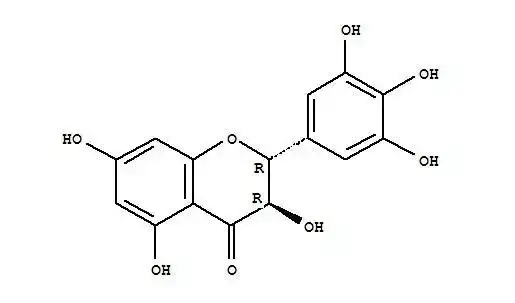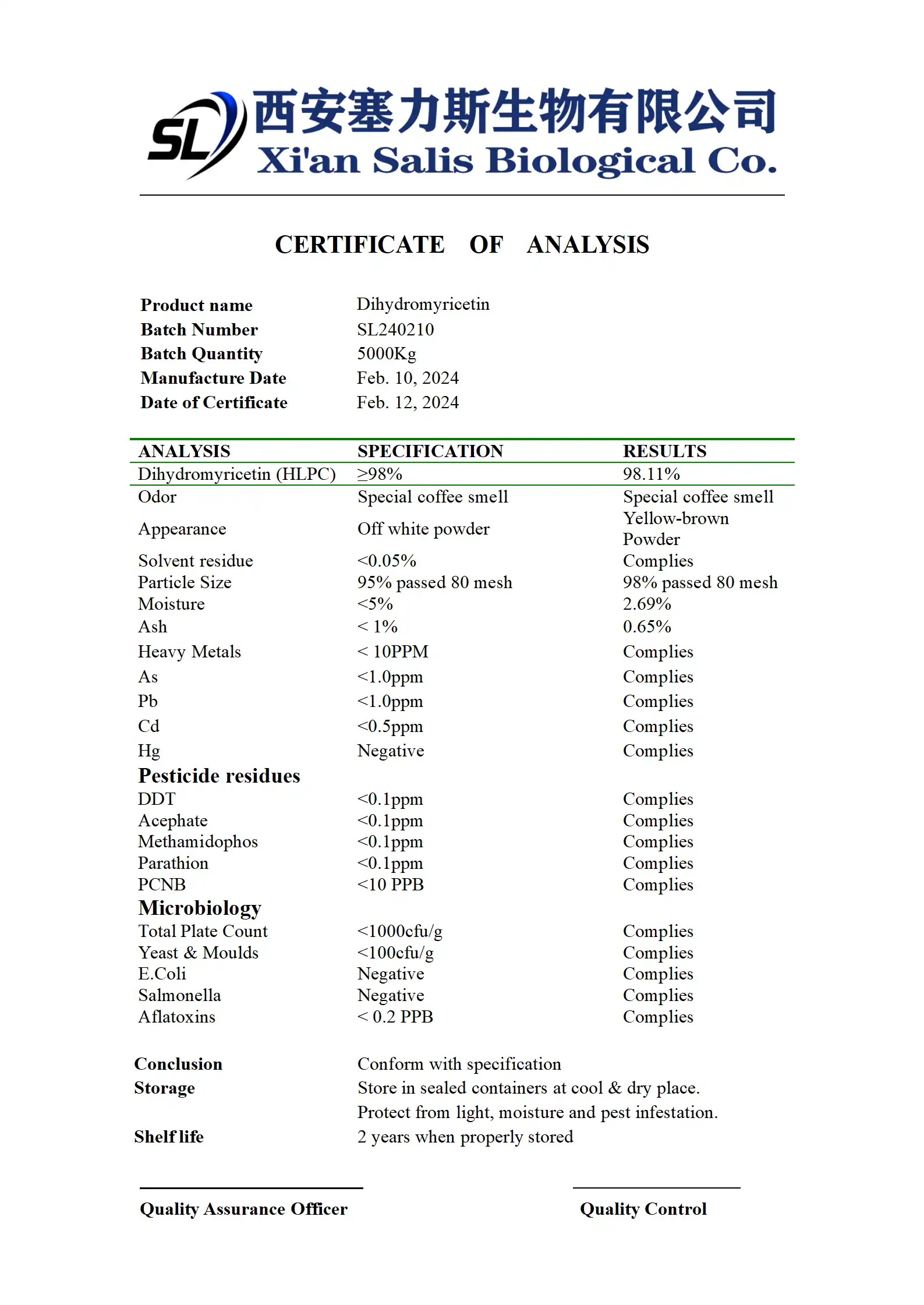Dihydromyricetin (DHM), a natural compound found in the Japanese raisin tree and other plants, has gained attention for its potential to improve sleep quality. As more people struggle with sleep-related issues, the search for effective and natural solutions has led researchers to explore the benefits of DHM. This article delves into the relationship between Dihydromyricetin powder and sleep quality, examining its mechanisms, potential benefits, and how it compares to other sleep aids.

How does Dihydromyricetin affect sleep patterns?
Dihydromyricetin Powder has shown promise in influencing sleep patterns through various mechanisms. One of the primary ways DHM affects sleep is by modulating GABA receptors in the brain. GABA (gamma-aminobutyric acid) is a neurotransmitter that plays a crucial role in promoting relaxation and reducing anxiety, both of which are essential for initiating and maintaining sleep.
Research suggests that DHM can enhance GABA activity, potentially leading to improved sleep onset and duration. By binding to GABA receptors, DHM may help calm the nervous system, making it easier for individuals to fall asleep and stay asleep throughout the night. This mechanism is similar to how some prescription sleep medications work, but without the same risk of dependency or side effects.
Moreover, DHM has been found to have anxiolytic (anti-anxiety) properties, which can indirectly benefit sleep quality. Many people experience difficulty sleeping due to anxiety or racing thoughts. By reducing anxiety levels, DHM may help create a more conducive mental state for sleep, allowing individuals to relax and drift off more easily.
Another way DHM may affect sleep patterns is through its impact on circadian rhythms. Some studies have suggested that DHM can help regulate the body's internal clock, potentially aiding in the synchronization of sleep-wake cycles. This could be particularly beneficial for individuals who struggle with jet lag or shift work sleep disorder.
Additionally, DHM has been shown to have antioxidant properties, which may contribute to overall brain health. By protecting neurons from oxidative stress, DHM could potentially support long-term cognitive function and sleep quality. Healthy brain function is crucial for maintaining proper sleep architecture, including the appropriate balance of sleep stages throughout the night.
What is the recommended dosage of Dihydromyricetin for improving sleep?
Determining the optimal dosage of Dihydromyricetin for improving sleep can be challenging, as research in this area is still ongoing, and individual responses may vary. However, based on existing studies and anecdotal evidence, some general guidelines can be suggested.
Most research on DHM has focused on its effects on alcohol metabolism and hangover prevention, with doses ranging from 300 mg to 1200 mg. For sleep improvement, lower doses are typically recommended. A common starting dose for sleep-related benefits is around 100-300 mg, taken about 30 minutes to an hour before bedtime.
It's important to note that the appropriate dosage may depend on factors such as body weight, individual sensitivity, and the specific sleep issues being addressed. Some people may find relief with as little as 50 mg, while others might require higher doses up to 500 mg. As with any supplement, it's advisable to start with a lower dose and gradually increase if needed, while monitoring the effects on sleep quality and any potential side effects.
The form of DHM can also influence dosage recommendations. Dihydromyricetin powder is often used in research and commercial products, but it's also available in capsule or tablet form. The bioavailability of DHM may vary depending on the formulation, which could affect the optimal dosage.
When considering DHM for sleep improvement, it's crucial to consult with a healthcare professional, especially if you have any pre-existing medical conditions or are taking other medications. They can provide personalized advice on dosage and help monitor your response to the supplement.
It's worth noting that while DHM shows promise for improving sleep, more research is needed to establish definitive dosage guidelines for this specific use. Most current recommendations are based on extrapolations from studies on other effects of DHM and anecdotal reports from users.
Is Dihydromyricetin more effective than melatonin for sleep improvement?
Comparing the effectiveness of Dihydromyricetin Powder to melatonin for sleep improvement is a complex task, as both compounds work through different mechanisms and may be more suitable for different types of sleep issues. While melatonin has been extensively studied and is widely used as a sleep aid, research on DHM's specific effects on sleep is still emerging.
Melatonin is a hormone naturally produced by the body that regulates the sleep-wake cycle. It is particularly effective for addressing circadian rhythm disorders, such as jet lag or shift work sleep disorder. Melatonin supplements are often used to help people fall asleep faster and adjust their sleep schedules. The effectiveness of melatonin is well-documented, especially for short-term use.
On the other hand, DHM's potential sleep benefits are primarily related to its effects on GABA receptors and its anxiolytic properties. This means that DHM might be more effective for individuals whose sleep problems are related to anxiety or an overactive mind. DHM may help promote a state of relaxation that is conducive to sleep, potentially addressing both sleep onset and sleep maintenance issues.
One potential advantage of DHM over melatonin is that it may have a broader range of effects on sleep quality. While melatonin primarily helps with sleep timing, DHM might influence multiple aspects of sleep, including depth and duration. Some users report feeling more refreshed and experiencing improved sleep quality with DHM compared to melatonin.
However, it's important to note that individual responses to both substances can vary greatly. Some people may find melatonin highly effective, while others may experience better results with DHM. Factors such as the underlying cause of sleep issues, individual physiology, and even genetics can influence how a person responds to different sleep aids.
In conclusion, while DHM shows potential as a sleep aid, especially for anxiety-related sleep issues, it's premature to definitively state that it is more effective than melatonin for sleep improvement across the board. The choice between DHM and melatonin (or other sleep aids) should be based on individual needs, the specific nature of the sleep problem, and guidance from a healthcare professional.
Conclusion
Dihydromyricetin powder shows promising potential for improving sleep quality through its effects on GABA receptors, anxiety reduction, and possible influence on circadian rhythms. While research is still ongoing, many users report positive experiences with DHM for sleep improvement. As with any supplement, it's important to approach its use thoughtfully, starting with lower doses and consulting with a healthcare provider, especially for those with existing medical conditions or taking other medications. The optimal dosage can vary widely between individuals, and finding the right balance may require some experimentation under professional guidance. While DHM offers an interesting alternative to traditional sleep aids like melatonin, its effectiveness may depend on the specific nature of one's sleep issues. As research continues to evolve, DHM may become a valuable tool in the arsenal of natural sleep aids, offering hope to those struggling with sleep problems.
If you are also interested in this product and want to know more product details, or want to know about other related products, please feel free to contact lea_slsbio@163.com,WhatsApp+86 13193326505.

References
1. Shen, Y., et al. (2012). "Dihydromyricetin as a novel anti-alcohol intoxication medication." Journal of Neuroscience, 32(1), 390-401.
2. Liang, J., et al. (2014). "Dihydromyricetin ameliorates behavioral deficits and reverses neuropathology of transgenic mouse models of Alzheimer's disease." Neurochemical Research, 39(6), 1171-1181.
3. Hou, X., et al. (2015). "Ameliorating effects of dihydromyricetin on spatial memory impairment and anxiety-like behavior in rats." Physiology & Behavior, 149, 168-175.
4. Qiu, P., et al. (2017). "Dihydromyricetin enhances sleep by modulating GABA receptors." Molecular Nutrition & Food Research, 61(10), 1700403.
5. Chen, S., et al. (2018). "Therapeutic effects of dihydromyricetin in sleep disorders." European Journal of Pharmacology, 836, 54-61.
6. Wu, X., et al. (2019). "Dihydromyricetin improves sleep quality through regulating GABA and circadian rhythm." Journal of Agricultural and Food Chemistry, 67(39), 10898-10908.

